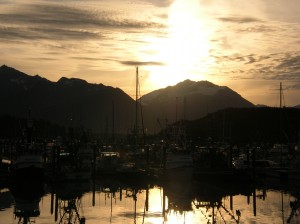The End of All Our Exploring
It is hard for me to choose a favorite part of T.S. Eliot’s Four Quartets; ask me one day and I shall give you a different answer than the next. But one line consistently speaks my language. I’ve tried to capture it again and again in my thinking and writing. I’ve written a novel manuscript with major themes revolving around it. I’ve placed it at the top of blogs, on notebook covers, on cards tucked in corners of the car or desk. It’s this:
We shall not cease from exploration
And the end of all our exploring
Will be to arrive where we started
And know the place for the first time.–“Little Gidding” V.25-29
 I doubt I will ever successfully capture the magic of that idea. I shall valiantly continue, and you will likely find it again and again as a theme in whatever work I happen to produce.
I doubt I will ever successfully capture the magic of that idea. I shall valiantly continue, and you will likely find it again and again as a theme in whatever work I happen to produce.
Of course, though, I would discover this weekend that G.K. Chesterton has beaten me to the punch, putting together words and phrases that encapsulate the concept just right.
More than a month ago, when I was leaving London for a holiday, a friend walked into my flat in Battersea and found me surrounded with half-packed luggage.
“You seem to be off on your travels,” he said. “Where are you going?”
With a strap between my teeth I replied, “To Battersea.”
“The wit of your remark,” he said, “wholly escapes me.”
“I am going to Battersea,” I repeated, “to Battersea viâ Paris, Belfort, Heidelberg, and Frankfort. My remark contained no wit. It contained simply the truth. I am going to wander over the whole world until once more I find Battersea. Somewhere in the seas of sunset or of sunrise, somewhere in the ultimate archipelago of the earth, there is one little island which I wish to find: an island with low green hills and great white cliffs. Travellers tell me that it is called England (Scotch travellers tell me that it is called Britain), and there is a rumour that somewhere in the heart of it there is a beautiful place called Battersea.”
“I suppose it is unnecessary to tell you,” said my friend, with an air of intellectual comparison, “that this is Battersea?”
“It is quite unnecessary,” I said, “and it is spiritually untrue. I cannot see any Battersea here; I cannot see any London or any England. I cannot see that door. I cannot see that chair: because a cloud of sleep and custom has come across my eyes. The only way to get back to them is to go somewhere else; and that is the real object of travel and the real pleasure of holidays. Do you suppose that I go to France in order to see France? Do you suppose that I go to Germany in order to see Germany? I shall enjoy them both; but it is not them that I am seeking. I am seeking Battersea. The whole object of travel is not to set foot on foreign land; it is at last to set foot on one’s own country as a foreign land. Now I warn you that this Gladstone bag is compact and heavy, and that if you utter that word ‘paradox’ I shall hurl it at your head. I did not make the world, and I did not make it paradoxical. It is not my fault, it is the truth, that the only way to go to England is to go away from it.”
If I were a different sort, I might just throw in the towel. But I’m a scrapper, G.K., and while I don’t do initials nearly as well as you and T.S., I shall continue to strive to say this same thing in a new way.

